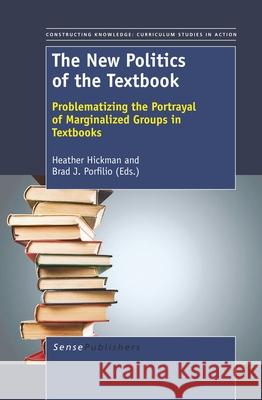The New Politics of the Textbook : Problematizing the Portrayal of Marginalized Groups in Textbooks » książka
The New Politics of the Textbook : Problematizing the Portrayal of Marginalized Groups in Textbooks
ISBN-13: 9789460919114 / Angielski / Twarda / 2012 / 348 str.
The New Politics of the Textbook : Problematizing the Portrayal of Marginalized Groups in Textbooks
ISBN-13: 9789460919114 / Angielski / Twarda / 2012 / 348 str.
(netto: 420,89 VAT: 5%)
Najniższa cena z 30 dni: 423,64
ok. 22 dni roboczych.
Darmowa dostawa!
In an age of unprecedented corporate and political control over life inside of educational institutions, this book provides a needed intervention to investigate how the economic and political elite use traditional artifacts in K-16 schools to perpetuate their interests at the expense of minoritized social groups. The contributors provide a comprehensive examination of how textbooks, the most dominant cultural force in which corporations and political leaders impact the schooling curricula, shape students' thoughts and behavior, perpetuate power in dominant groups, and trivialize social groups who are oppressed on the structural axes of race, class, gender, sexuality, and (dis)ability. Several contributors also generate critical insight in how power shapes the production of textbooks and evaluate whether textbooks still perpetuate dominant Western narratives that normalize and privilege patriotism, militarism, consumerism, White supremacy, heterosexism, rugged individualism, technology, and a positivistic conception of the world. Finally, the book highlights several textbooks that challenge readers to rethink their stereotypical views of the Other, to reflect upon the constitutive forces causing oppression in schools and in the wider society, and to reflect upon how to challenge corporate and political dominance over knowledge production.
In an age of unprecedented corporate and political control over life inside of educational institutions, this book provides a needed intervention to investigate how the economic and political elite use traditional artifacts in K-16 schools to perpetuate their interests at the expense of minoritized social groups. The contributors provide a comprehensive examination of how textbooks, the most dominant cultural force in which corporations and political leaders impact the schooling curricula, shape students thoughts and behavior, perpetuate power in dominant groups, and trivialize social groups who are oppressed on the structural axes of race, class, gender, sexuality, and (dis)ability. Several contributors also generate critical insight in how power shapes the production of textbooks and evaluate whether textbooks still perpetuate dominant Western narratives that normalize and privilege patriotism, militarism, consumerism, White supremacy, heterosexism, rugged individualism, technology, and a positivistic conception of the world. Finally, the book highlights several textbooks that challenge readers to rethink their stereotypical views of the Other, to reflect upon the constitutive forces causing oppression in schools and in the wider society, and to reflect upon how to challenge corporate and political dominance over knowledge production.











